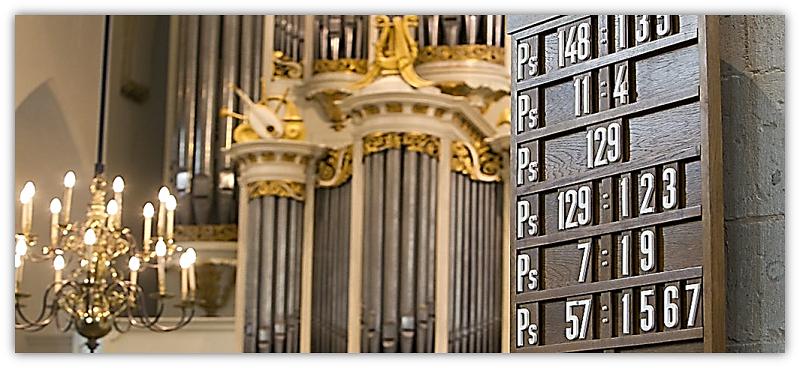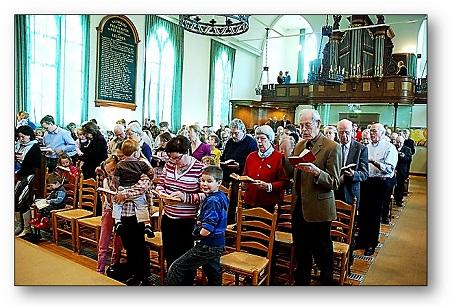"I" in Psalms and Hymns
"I" in Psalms and Hymns

In many church songs and hymns the theme is all about the individual believer’s personal feelings. This is often put forward as an objection to these hymns. But is it not also the case in the psalms?
I recently received a request for advice from a joint committee of two foreign churches. This committee had the task of making recommendations for the compilation of a common songbook of psalms and hymns for use in both churches. The instructions given to the committee were that a song of praise had to be free of individualism to be considered for inclusion. The committee had to face the fact that many psalms in the Bible are written in the ‘I’ form, the first person singular. So are these psalms also individualistic? If not, what is the difference between these psalms and individualistic hymns? What can be learnt from the psalms concerning what is, and what is not, a suitable hymn?
The questions posed by the foreign committee presented me with a good basis to write an article on the subject in De Reformatie. It also gave me the opportunity of commenting on the book Gods lof op de lippen by Dr Jan Smelik, a co-writer in De Reformatie. This book, published in 2005, had not yet been reviewed in the aforementioned church magazine. It was time to make up for that.
Who is ‘I’?⤒🔗
It cannot be denied that there are more psalms in the ‘I’ form (first person singular) than in the ‘we’ form (first person plural). One has only to leaf through the Book of Psalms to see that. But how should that ‘I’ be interpreted? Whom does it portray?
In the titles of many psalms we find the heading ‘of David’. Whether that must always be read as ‘David has written this psalm’ is questionable, yet it is the most obvious conclusion. See, for example, Psalm 18:
Of David the servant of the LORD. He sang to the LORD the words of this song when the LORD delivered him from the hand of all his enemies and from the hand of Saul.
The Psalm title continues with
I love you, O LORD, my strength.
It is logical to think of David as that ‘I’.
For centuries it had been common practice to read the psalms in this manner. That changed during the course of the nineteenth century, when scholars started to exegete the psalms without reference to their titles. The ‘I’ was no longer attributed to David, so a different interpretation had to be found. Around 1900, the idea was popular that the ‘I’ was a personification of the Jewish community after the exile. So the ‘I’ was not an individual, but a collective: the pious Jews, who collectively suffered enmity and oppression. This opinion could not be maintained for long. The view that the ‘I’ was definitely an individual rightly gained prominence again. Some discussion did develop concerning the question of whether this individual was a common Israelite. Some psalm interpreters were convinced that in many psalms the ‘I’ was the people’s king. A king is an individual, but at the same time he is more than that. He often speaks not only for himself but also as the leader and representative of his people. One who was partial to this approach was Prof. Dr Nic. H. Ridderbos. In his explanation of the psalms in De Korte Verklaring, he regularly favoured this view.
The idea that the psalmist is a king is not so extraordinary. The titles connect many psalms to David, who for a long time was king of Israel. So it should come as no surprise that royal features are found in the psalms. Yet it is taking it too far to say that the ‘I’ in the psalms always refers to a king. Many psalms can easily be read as songs or prayers expressed by common Israelites. That is also the case with the psalms written by David. He may have written those psalms from his special position as a (future) king. Yet he could also have written them as a common believer, or for the use of his brothers and sisters in the faith.1

Individual but not Individualistic←⤒🔗
Many psalms are expressed in the ‘I’ form, and one can often read them as an individual believer’s songs or prayers. But that does not make them individualistic. Characteristic of individualism is where a person speaks or acts exclusively for himself with no reference to others. Such a disposition is not applicable to the believers in the psalms.
In many places in the psalms it is apparent that the ‘I’ knows himself to be connected to the whole of God’s people of Israel, or to the righteous among his fellow people (cf. Ps. 5:11-12; 92:12-15; 140:12-13). Psalm 25, for instance, can easily be read as an individual believer’s prayer. Yet the psalm also speaks in a more general sense of the prosperity that will come to those who fear the Lord (vv. 12-13). The psalm also ends with a prayer for the whole of Israel: “Redeem Israel, O God, from all his troubles!” (cf. Ps. 28:9; 51:19; 69:35-36; 130:7-8; 131:3). In other psalms, the individual psalmist promises to praise and thank God for His salvation among his fellows (cf. Ps. 22:22, 25; 26:12; 35:18; 116:13-14, 17-19). In this way he desires to include others in his praise of God.
Psalm 66 is perhaps the most remarkable example in this connection. Up to verse 12 the psalm is composed in the ‘we’ form. The Israelites who are speaking here proclaim God’s great historic acts during the exodus from Egypt and the conquest of Canaan (cf. vv. 6 and 12). They feel so involved in God’s acts that they speak as if they experienced them themselves. Yet the psalm could well be from a far later date. But to the Israelites of later times the past is not forgotten. They feel totally at one with their forefathers of past generations. From verse 13 onward, the psalm continues in the first person singular. An Israelite takes the stand and declares how God answered his prayers and saved him. His personal deliverance is not isolated from the deliverance of the whole of the people. The bond between the two is so close that he can express his gratitude in connection with what his people sang in verses 1-12. Verses 13-18 may therefore sound individual, but they are certainly not individualistic.
However, there are psalms in which such references to God’s people or other members are missing altogether — psalms in the first person singular where the ‘I’ does not explicitly express his connection to others. The clearest examples of these are Psalms 6, 13, 38, 54, 56, 88, 120, 139 and 143. Evidently, the psalmists did not always find it necessary to indicate in words their connection with other Israelites. One may desire to read these psalms as ‘individualistic’ texts. But then one must isolate them from their context in the Book of psalms, where they are flanked by many truly non-individualistic songs.
For Various Occasions←⤒🔗
We have seen that some psalms do indeed exhibit an individual tone. At the same time, it can be difficult to discern the exact circumstances in which the first-person narrator found himself. Description of the situation is usually left a little vague. Though this might seem a drawback, since we would often like to know more about what was actually occurring, yet such a drawback can be seen as an advantage. A psalm in which the circumstances of the narrator are not described in detail can more easily be used by others in different situations at a later date. The psalms are not so individualistically formulated that only individuals can identify with them. Others can also ‘experience’ the same sentiments. They can adopt these prayers and songs in their own situations.
That does not mean that every psalm is suitable for use in every circumstance. The prophet Nathan revealed how David had sinned through his adultery with Bathsheba and the subsequent murder of Uriah. At that moment, Psalm 51 was for David a fitting psalm to confess his guilt. Psalm 26, with the words “for I have led a blameless life”, could not be sung by him on that occasion. Thankfully, there were other moments in his life when he could sing those words.
Augustine←⤒🔗
The psalms teach us how to praise God in songs and prayers. Not only was this the conviction of Calvin, who gave the singing of psalms a meaningful position in the Reformed worship service, but it was also the conviction of the Church Father Augustine. Augustine stated in a sermon that we should try to find out from the Scriptures how to praise God. We may not deviate to the left or the right from the path the Scriptures teach us. In the Scriptures, God praises Himself in order to be rightfully praised by man. Because God considers it worthwhile to praise Himself, man can discover how to praise Him.2

Here Augustine is referring to the teaching of the Scriptures in general. He does not specifically mention the Book of Psalms. But taking account of the fact that he makes these comments in the introduction to a sermon on Psalm 145, we infer that he most certainly had the psalms in mind.
The ‘I’ Song is Acceptable←⤒🔗
What do the psalms teach us about how we should praise God? For the present purpose the question can be limited to: what do the Psalms teach us about the acceptability of ‘I’ songs in the Christian congregation’s worship services?
In the Book of Psalms we find various texts that are not of an individual nature. God’s people as a whole are speaking in these psalms. The people sing and pray in the ‘we’ form (cf. Ps 46; 67; 79). If a songbook wishes to follow the example of the Book of Psalms, then it should not consist only of ‘I’ songs.
At the same time, we have seen above that among the biblical psalms we can also find texts in the ‘I’ form that do not contain a single reference to other members of God’s people.
If that is possible and permitted in the psalms, it is also acceptable in a church hymnbook. One cannot invoke the psalms in order to reject a hymn simply because it is written in the first person singular and gives vent to personal feelings.
Smelik←⤒🔗
Such an insight accords with the view of Dr Jan Smelik in his book Gods lof op de lippen. Smelik opposes the idea that use of the first person singular renders a song unsuitable for use as a church hymn “because it would be too subjective and too individualistic” (p. 59). He rightly calls upon the psalms to demonstrate it.
In his opinion, it is permissible to formulate individual feelings and thoughts in church songs and hymns. Does not the same occur in the psalms? The only condition is that these feelings should be recognizable to the congregation as a whole. In other words, whatever is formulated in a hymn should not be so personal that nobody but the poet can identify with it.
According to Smelik, this condition is met where a song is about the remembrance of God, and when the Scriptures are expounded in it. The teaching of the Scriptures, particularly concerning God’s salvation in Christ, must be recognizable in a church hymn. This view must not be obscured through an excess of personal details (p. 60).
This seems a convincing and down-to-earth answer to the question whether hymns written in the first person singular can find a place in the hymnbook of a Christian congregation. If we follow the example of the psalms, we must say that there can be no meaningful objection, provided the congregation can identify with the expressions in such hymns.
Broad Attention←⤒🔗
Naturally, a good church hymn must satisfy many more requirements than just that the whole congregation can identify with it. It needs to be stressed that this present article is dealing with only one aspect of whether individual songs can be included in church songbooks. Of course, this says nothing about other requirements that need to be met, such as faithfulness to Scripture, how easily it can be sung, etc.
What more can be learnt from the psalms about the demands that a song must meet to be judged suitable for a Reformed hymnbook? We cannot here attempt a complete overview, but will touch on a few issues connected to the question of expression of individual feelings in psalms and hymns. The psalms are about personal spiritual life with God and deliverance from sin, but other subjects are also addressed. Psalms 19 and 104 sing about nature, and praise God for His great acts in creation. Various psalms describe God’s mighty deeds in the history of Israel, such as the exodus from Egypt, the journey through the wilderness, the conquest of Canaan, the deliverance of Israel from oppression by their enemies, etc. (cf. Ps. 44; 78; 80; 105; 106). The psalms are certainly not just about individual experiences or about ‘God and my soul’. The whole of life — past, present and future — is in the picture. In a very different manner, the psalmist in Psalm 139 reveals that his view is much broader than just his own personal spiritual life. Psalm 139 is a personal psalm, with no explicit reference to other believers. Yet the person praying also says that he will hate those who hate the Lord and abhor those who rise up against Him (v. 21). Those are much discussed and weighty words. Nevertheless, they do show us that the individual psalm petitioner makes God’s business his business. He gives a moving description of how God created him as a living being (vv. 13-16). At the same time, he places his life in a broader perspective: connected to God’s cause, His name and His honour.

A final observation: the psalms pay a great deal of attention to the enemies that threaten God’s faithful followers. There is room for the expression of complaints and not only for conveying the highlights of personal life. The psalms are very realistic. The expressions devoted to the troubles of life are at least as many as those dedicated to the joyful moments.
Variation←⤒🔗
Must all these elements then be formulated in every hymn? It goes without saying that not every hymn has to include all elements. Each separate Psalm does not meet this requirement either. Just as some psalms are suitable in certain situations, but less so or not at all suitable in others, so it can also be with hymns. They do not have to be suitable at every moment, and do not have to do justice to everything.
It also depends on what sort of hymnal a church wishes to have. Does the church simply require a number of hymns to be available that express the fulfillment of God’s promises in Christ more clearly than in the psalms? In that case, the hymnal need not be nearly as broadly orientated as the Book of Psalms.
Or does a church aim for an extensive broad volume of hymns for the New Testament congregation, to be used alongside the Psalms? These past years, the Reformed Churches in The Netherlands have chosen this option, and some valid arguments can be adduced in support of that choice. In such a case, the teaching of the Psalms about the broad orientation of the songbook of God’s people should be put into practice.
Hymns cannot be rejected merely because they are in the first person singular, or because they verbalize personal feelings. Things only go awry when a songbook consists of such hymns alone. The psalms show us that our hymnbook should contain much more than that.

Add new comment